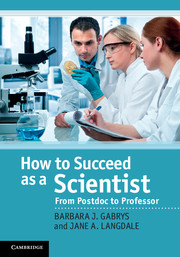Book contents
- Frontmatter
- Contents
- Preface
- Acknowledgements
- Part I Becoming an independent researcher
- 1 Managing your time
- 2 Giving a good research talk
- 3 Writing a quality research paper
- 4 Handling scientific criticism
- 5 Writing grant applications
- 6 Tools for managing research projects
- 7 Is there life beyond academia?
- 8 Applying for a job in academia
- 9 Applying for an independent research fellowship
- Part II Thriving in your new job
- Part III Managing your career
- Index
- References
2 - Giving a good research talk
from Part I - Becoming an independent researcher
Published online by Cambridge University Press: 05 November 2011
- Frontmatter
- Contents
- Preface
- Acknowledgements
- Part I Becoming an independent researcher
- 1 Managing your time
- 2 Giving a good research talk
- 3 Writing a quality research paper
- 4 Handling scientific criticism
- 5 Writing grant applications
- 6 Tools for managing research projects
- 7 Is there life beyond academia?
- 8 Applying for a job in academia
- 9 Applying for an independent research fellowship
- Part II Thriving in your new job
- Part III Managing your career
- Index
- References
Summary
There is only one steadfast rule to ensure that your research talk is a success: ‘know your audience’. Occasionally, you will give research talks to very specialised audiences who are desperately interested in your science and will listen even if you speak to your feet. However, most of the time this will not be the case and you should be aiming to entertain as many people as possible. There is no better advert for your research programme than someone outside of your field telling someone else that they heard a great talk by X on Y. This chapter provides guidance on how to engage your audience.
The theory
Explaining your research to your peers, funding councils, other stakeholders and the general public is a professional necessity. Unfortunately, however, scientists do not enjoy the best reputation as communicators even when giving a research talk aimed at their peers. There are plenty of books and websites giving advice on how to use packages such as PowerPoint, how to decide about the content of a presentation or how to keep the audience interested using multimedia (Meredith, 2010). These sources will tell you how to improve your performance, to keep to time and to deal with the questions during the talk or after it. This is all very useful and important but we think that the key to a successful presentation is your engagement with your subject and your audience.
If you go to a live performance by famous musicians, you might notice something – invariably the music speaks through them, their bodies and instruments. The best ones are no longer there in some sense; they are lost, immersed; they channel the music. They are not preoccupied with how they look or what the audience thinks about their performance – the only thing that counts is living the music – becoming the music. Much the same can be said about a research talk, no matter what the subject is. The best speakers we have heard were ‘hardly there’ – all that counted was their subject; they were the subject.
- Type
- Chapter
- Information
- How to Succeed as a ScientistFrom Postdoc to Professor, pp. 18 - 26Publisher: Cambridge University PressPrint publication year: 2011



